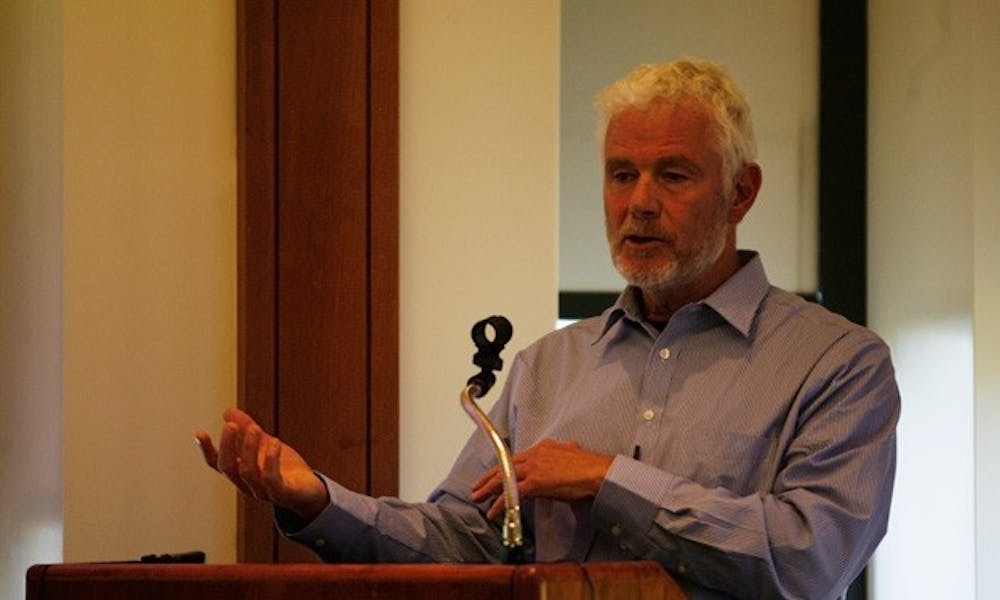After decades of turmoil, Afghanistan still has a long road to recovery, an experienced war correspondent said Wednesday.
Edward Girardet, a journalist who has spent more than 30 years covering conflict in Afghanistan, spoke about his work to a group of 30 graduate students and local residents in the Sanford School of Public Policy. He detailed his time in Afghanistan and gave insights on the nation’s present-day struggles.
Girardet, a Swiss-American now working for National Geographic and other media outlets, first went to Afghanistan in 1979 on the advice of a friend. One motivation for going was the isolation he felt when many of his friends began to cover other wars at the time, he said.
“I felt a bit, as a young reporter, a bit out of this,” Girardet said. “I actually was looking for a war, to put it bluntly.”
Girardet said he traveled mostly on foot, and frequently with anti-Soviet Mujahedeen forces. He often stayed in villages, and even after walking for hours would talk to his hosts late into the night.
“We had a very close connection to the Afghan people,” he said. “One of the ways we traveled was with French doctors—we were able to talk to women that way.... They had this close contact.”
Girardet’s presentation, co-sponsored by Sanford, the Duke Center for International Development, the Dewitt Wallace Center for Media and Democracy and the Duke-University of North Carolina at Chapel Hill Rotary Peace Center, was titled “Afghanistan, The Great Pretend Game,” and drew from his recent book, “Killing the Cranes: A Reporter’s Journey Through Three Decades of War in Afghanistan.”
Catherine Admay, visiting professor of public policy, brought Girardet to the University. Admay said she hoped attendees would appreciate his real-world experience.
“So many think you can learn what you need to learn in the stacks,” Admay said. “But at some time you absolutely need to have people who have also hit the mountain—this is a man who’s trekked 16 hours to get stories we don’t have in the stacks.”
Among the many things Girardet did while moving with the Mujahedeen in Afghanistan, he encouraged the ethical treatment of prisoners. He carried comic books about the Geneva Convention with him in order to dissuade commanders from executing prisoners. He said he found it hard to convince people with the Geneva Convention argument alone and shared an argument he found more effective.
“I’d say look, Allah wants you to be magnanimous, to show mercy—just think of all the publicity you’ll get if you release your prisoners,” he said.
Girardet first met Osama bin Laden in 1989 and the two had an interesting but tense conversation, he said. He said bin Laden was taken aback at least once during the 45-minute conversation, and as they parted ways, bin Laden threatened to kill Girardet if he ever saw him again.
Also in his remarks, Girardet analyzed the current state of affairs in Afghanistan and offered suggestions for the country’s development, noting that the country’s past will complicate recovery.
“If you want to understand Afghanistan today, you have to understand what happened in the ’80s and ’90s,” he said.
Girardet also critiqued military action against the nation and said that the Taliban—the Islamic fundamentalist group that ruled large parts of Afghanistan since 1996—was already imploding when the nation was invaded by U.S. forces in 2001.
“The Taliban was another faction in a civil war,” he said. “The moment you take sides in a civil war, you’re asking for trouble.”
Girardet also noted significant corruption and a lack of educational opportunities for youth but did express some optimism.
“The situation has become disastrous, but I don’t think all is lost,” he said. “Refocus the military lens to the recovery lens.”
Ivy Blackmore, a second-year Master of Public Policy student, said she appreciated Girardet’s emphasis on the need for open communication.
“I’m studying international development policy, and a lack of communication and transparency of information is something that’s a common theme where there’s any development going on,” Blackmore said.
Get The Chronicle straight to your inbox
Signup for our weekly newsletter. Cancel at any time.

